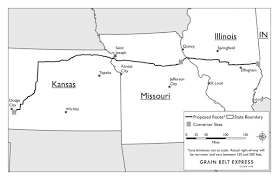
The more than $2 billion wind project called the Grain Belt Express is once again facing opposition from legislators in Missouri.
The project, designed to carry wind-powered electricity from Kansas to Ilinois and Indiana could could be unplugged, according to the St. Louis Post-Dispatch.
On Monday, a House panel heard testimony from Rep. Jim Hansen, R-Frankford, who is sponsoring a plan to block the Grain Belt Express transmission line from taking land for the project through the use of eminent domain.
The moves come despite a December court ruling that backed up action by the Public Service Commission, which earlier endorsed the project in its role as a public utility monitor.
“We’re hoping this year we can protect the people’s property rights,” Hansen said. “This project would be very destructive to our agricultural industry.”
“Well, here we go again,” added Rep. Jeff Shawan, R-Poplar Bluff.
The $2.3 billion project, which aims to bring Kansas wind energy to Missouri, Illinois and Indiana, is expected to cross the property of 570 Missouri landowners, stretching across more than 200 miles and eight northern counties.
The project has been in the works since 2010.
A coalition of municipal utilities, including Kirkwood, Columbia and Hannibal, already has agreed to buy a portion of the 500 megawatts of power that would be made available in Missouri — a deal that helped persuade utility regulators that the project is in the public interest.
A spokeswoman for Chicago-based Invenergy, which is spearheading the project, said the power line project will have a significant economic impact in the state.
“This project will create thousands of jobs here in Missouri,” said Nicole Luckey.
In addition, she said the company is prepared to pay more for land than its fair market value.
“We are committed to compensating landowners fairly,” Luckey said.
Landowners in the path of the transmission lines argue that a private company should not be able to condemn land in order to build the project.
“The right of eminent domain … should not be given to private entities,” said Paul Agathen of the Missouri Landowners Alliance, which was formed to fight the line.
Invenergy says its structures will take up less than 10 acres of land throughout Missouri, not including land underneath transmission wires.
The company says the power line could result in $32 million in payments to Missouri landowners and $7 million in property taxes to local Missouri governments in its first year of operation.
The legislation is similar to a proposal approved by the full House last year. The legislation ultimately died in the Missouri Senate after a bipartisan group of senators filibustered the bill.
The legislation is House Bill 2033.
Source: St. Louis Post-Dispatch





